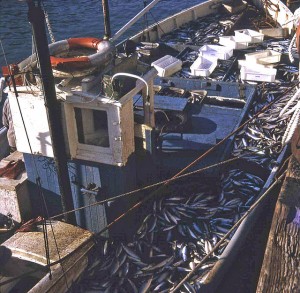Scientists warn of a potential mass ocean extinction
Is ocean life facing mass extinction?
It’s a question that makes the breath catch in the throat—because if such a thing is possible, it has major implications for the planet and humankind itself would be facing a crisis of unprecedented proportions.
The journal Science released a report in January stating that such a thing may not only be possible, but that it could be imminent. The New York Times followed with a story that brought focus and attention to the issue.
The bottom line is that fish species, in particular, are at risk and that human behavior is the primary problem.
The AMSA Voice spoke with teachers Christopher Brandes and Timothy Vaillancourt of the science department to get their input and analysis.
“With the current climate change, we are increasing carbon dioxide in the atmosphere, and to balance out the carbon dioxide in the atmosphere, it is being sequestered into the ocean,” said Mr. Vaillancourt, who teaches earth science. “That is actually increasing the acid content in the ocean.”
And once that starts to impact animal life, it’s a domino effect that is hard to reverse.
“Will we see the fish populations bounce back?” asked Mr. Brandes, who teaches biology and sustainable. He answered his own question by saying that it is very difficult. “People [would] have to self-regulate.”
Regardless, fish populations already are decreasing significantly, through additional factors such as over-fishing, which begs the question: What is the alternative?
“Fish farming,” Mr. Brandes said. “As of late, it has become more financially viable for companies to go out and farm fish.”
In this process, fish are held captive in extremely big nets and fed hundreds of pounds of feed once or twice per day, which is “ironically made from chicken by-product,” Mr. Brandes said.

Over-fishing is one of the primary concerns in terms of humankind’s impact on the sustainability of sea life.
Instead of trying to restore habitats, people have found it more viable to grow their own fish. Mr. Brandes explained that the mentality of companies is simply this: “Instead of investing my money in a whole fleet and have the catches go up and down, I’d rather have something consistent like farming fish.”
But there are some potentially negative consequences to this solution.
“As of last year, the FDA approved that salmon can be genetically modified,” Mr. Brandes said. “They put a gene into the fish to tell it to grow larger with less bone mass.”
But what would happen if these salmon, or any fish for that matter, were to escape into the environment?
“The environmental impact is if those fish were to escape and start breeding with the natural salmon population, there could be a genetic mix up,” Mr. Brandes pointed out.
Furthermore, fish farming takes place inland to avoid major storm surges. Any waste that the fish produce does not go far, thus creating an excess of nutrients in the shoreline environment.
“This can be detrimental to shore life,” Mr. Brandes said.
Mr. Vaillancourt feels fish farming is not the solution.
“As far as fish farming goes, I feel that it is an improper way of solving the problem,” said Mr. Vaillancourt, who believes that the best way to fix this issue is to regulate commerce.
“With regulations and eco-friendly fishing—setting the limits, making sure there is a good population control—and having a world’s commerce company overseeing all fishing regulations across the world, then we can actually not over-fish,” he said.
But Mr. Brandes said that regulating commerce is difficult. He feels we cannot simply monitor every fishing boat that is out in the ocean like they do in Alaska, where the Coast Guard helps enforce regulations.
“In the middle of the ocean, it is not financially viable to fly so many jets over the Atlantic and monitor [fishermen],” he said.
“[But] fish farming tends to increase a lot of phosphates,” Mr. Vaillancourt said. “It takes a lot of water and energy to breed these fish. They do not have the same taste. It is almost more beneficial to get them from the ocean as long as you are not over-fishing a population.”
So begins the debate. How do you convince the fisherman who is trying to make a living to also try and save fish populations through natural means?
Will fish farming become a solution or will humanity, in the end, be caught at the end of the line?

Anagha Indic is one of two co-editors for The AMSA Voice and a member of the Class of 2015. Anagha is an avid learner in pursuit of an engineering career.
She...







